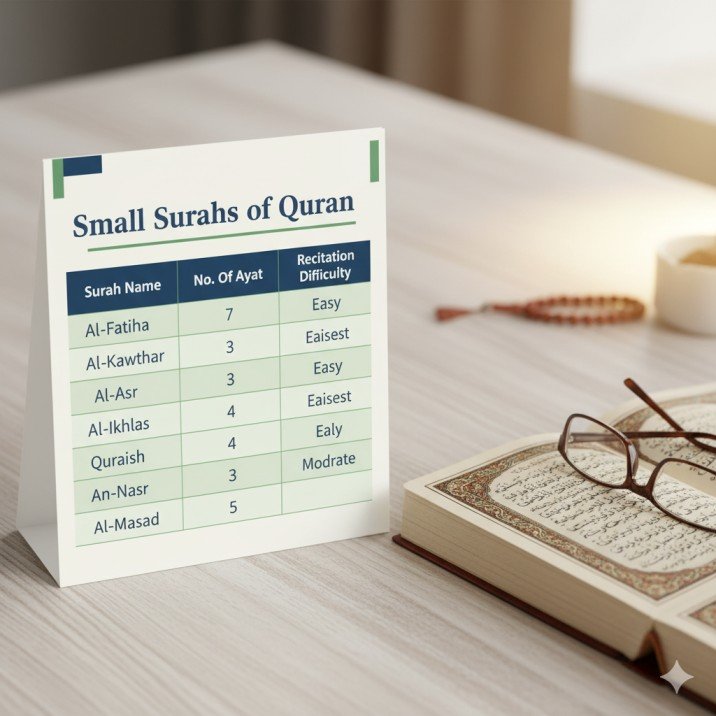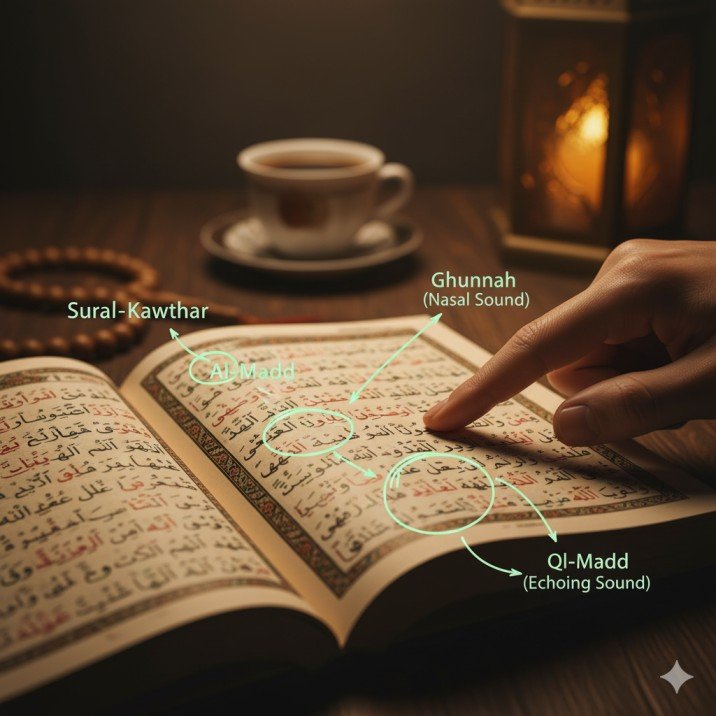Ahmed a young Student lives in UK he is 9 years old and he always having a problem with Quran recitation and Tajweed.
One day he hears from his friend Muhammed that he learned the Tajweed and Quran recitation with one of Zaid academy tutors and he used a very simple technique he started with the small surahs of Quran.
In this article we will learn more about small surahs in Quran and how to use them in our study plan
They are the Surahs where the number of Ayat is 7 or less numerated as below

Easiest Surahs from the above table will be Al-Kawthar and Al-Ikhlas they are easy to memorize and recite, they both are 3 Ayat.
Did you know the Surah?
Not yet
It is Al-Fatiha the most important Surah in the Quran, do you know why?
Because without Al-Fatiha your pray will not be accepted it is an essential part of Muslim pray.
Al-Fatiha is mainly a Duaa for the Muslim and it is used by Muslims for “Barakah” and “Rizk” i.e. increase your health, Money, happiness.
If you have a problem in Al-Fatiha Recitation or memorization contact us today.
Beginners always face difficulties in reciting Quran specially if they are non-Arabic speaker therefore the best start for them is with Small Surahs of Quran.
It is a very important step and I will tell you why
The short Surahs (like Al-Fatiha, Al-Kawthar, Al-Asr, Al-Ikhlas, etc.) are rich with many fundamental Tajweed rules. These Surahs are often used by beginners to practice and master basic recitation.
Here are the main Tajweed rules found in the small Surahs:
Did you know the Surah?
Not yet
It is Al-Fatiha the most important Surah in the Quran, do you know why?
Because without Al-Fatiha your pray will not be accepted it is an essential part of Muslim pray.
Al-Fatiha is mainly a Duaa for the Muslim and it is used by Muslims for “Barakah” and “Rizk” i.e. increase your health, Money, happiness.
If you have a problem in Al-Fatiha Recitation or memorization contact us today.

This rule applies to the letters Noon (N) and Meem (M) when they are doubled (have a Shaddah).
These Surahs cover the most common types of prolongation:
This rule applies to the five “Qutb Jad” letters (Q,Ṭ,B,J,D) when they are silent (Saakin).
These rules govern how the silent Noon (N) or the Tanween (double vowels) are pronounced when followed by other letters.
This involves pronouncing letters with emphasis (Tafkhīm) or thinning (Tarqīq).
The ability to recite these short Surahs correctly with Tajweed is a foundational skill for every Muslim.
It is a very important question. Quran recitation (often referred to as Tilāwah or Tartīl) is the vocal and rhythmic practice of reading the Holy Quran. It is a highly spiritual act of worship that goes beyond simple reading.
Quran recitation in General should be taught be Quran Tutor who know the rules of Tajweed and the student will recite Quran in front of the Tutor and he will correct his recitation.
DON’T TRY TO RECITE QURAN BY YOUR OWN

Book now Free trial with one of our handpicked Egyptian Tutors and start you learning Journey with Quran
Zaid Academy is an online Islamic academy that provides one of the best Arabic, Quran and Islamic Studies programs for kids and adults.
All rights reserved by 2024 © Zaid Academy
Not a member yet? Register now
Are you a member? Login now